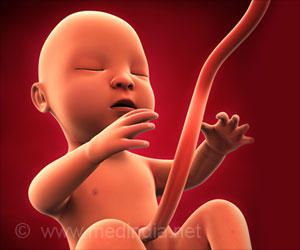“We think that when a woman has COVID-19 in pregnancy, the placenta is shedding off ACE-2 as a way to block SARS-CoV-2 from being passed to the fetus,” explained co-corresponding author Elizabeth S. Taglauer, MD, PhD, assistant professor of pediatrics at BUSM. This research appear in the
.
The study took part as a collaborative effort between placental/perinatal researchers at BUSM, Boston Medical Center (BMC), Ke Yuan, PhD a lung vascular biologist at Boston Children’s Hospital and Hongpeng Jia, PhD, an ACE-2 expert at Johns Hopkins University.
It involved collecting placentas from two groups of women who delivered at BMC from July 2020 to April 2021, an effort led by study co-author Elisha Wachman, MD, an associate professor of pediatrics at BUSM and a neonatologist at BMC. The first group women had normal pregnancies and had no report of COVID-19 infection. The second group of women were COVID-19 positive and had active COVID-19 disease during pregnancy.
They were then observed the ACE-2 expression in their placentas under the microscope and compared placental ACE-2 expression by using genetic and protein analysis techniques.
The researchers found that the placenta has many similarities with the lung, and so this study also emphasises on the importance of studying the placenta, to help understand a variety of lung diseases, and highlights the important role of controlling ACE-2 as a way to prevent COVID-19 infections.
“The placenta is one of the few `success stories’ of the pandemic. If we understand how the placenta is naturally protecting babies from COVID-19, this may provide important information for therapies and strategies to help prevent other SARS-CoV-2 infections from continuing to spread,” adds Taglauer, a neonatologist at BMC.
This research was funded by the Boston University Clinical and Translational Science Institute COVID-19 Pilot Grant Program, UL1TR001430 (ET,EW), and supported by research grants from the National Institutes of Health (R21AI14932 and R01AI148446 to H.J. and 5R01HL150106-02 to K.Y.)
Source: Medindia



